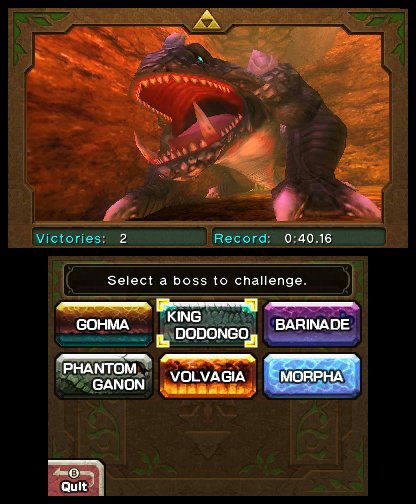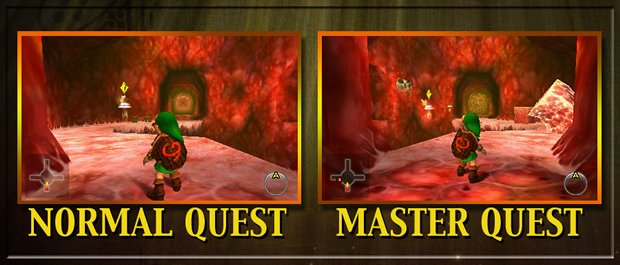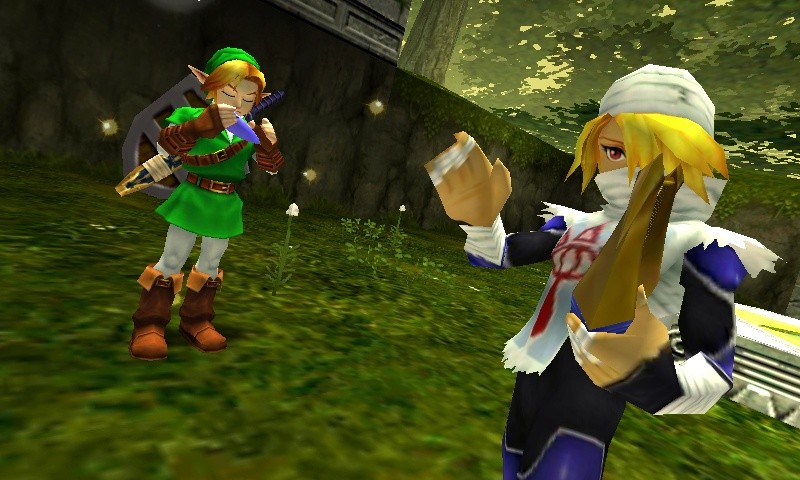Why you can trust GamesRadar+
The 3DS includes a gyroscope and accelerometer, which are fancy terms for “motion control.” What it means for Ocarina is a first-person viewing mode that acts like a pair of Link’s eyes, moving precisely as you do, allowing for precision aiming or 360 degree viewing of the game world. I filmed this example with a Flipcam to give a basic idea of how the function works:
It’s a cool addition, and does make aiming with the Fairy Slingshot or Fairy Bow a tad easier than using the analog slider, but it does involve physically moving the unit around. If you have the space, go for it, it’s a pretty cool effect. If not, regular controls work just fine.

Then there’s the boss rush mode, which allows you to face any boss you’ve already beaten in the main game. Beat them all and you can then engage in a boss battle gauntlet that pits you against the entire roster all in a row – sounds like a great opportunity for 3DS leaderboards, right? Sadly, there’s no such functionality, nor are there any StreetPass features. Why Nintendo let a marquee title like this slip through without using the 3DS key features is beyond me. Seems like a great way to make people aware of ‘em, but whatever.

The 3DS version also includes the Master Quest, a revised and noticeably more difficult “remix” of the main quest. This was available on GameCube, so Nintendo went one step further and flipped the entire thing, such that all lefts are rights (including Link himself, har). This mode is available from the start, and does not have to be unlocked.
As for the literal 3D in the game… well, it looks quite nice in spurts, but my eyes could only take so much. Riding through Hyrule Field or scurrying through the Lost Woods in 3D is a fine treat in small doses, and looks better than most other 3D attempts on the system, but it also happens to look and play great with the 3D turned off.
Is it better than...

Ocarina of Time?Yes, merely because this is everything the original was, plus some. Better graphics, cleaner textures, smoother animations, easier inventory navigation… just about everything that could have been improved (without drastically altering the game) has been. If I were to recommend a version to a brand new gamer, the 3DS version would be it.

Spirit Tracks?Yes, though it’s not entirely fair to compare them. Spirit Tracks builds on the touch-only ideas introduced in Phantom Hourglass, and intentionally strays from the main canon by placing Link on a train, and fighting a bad guy who’s hardly as menacing as Ganon. Ocarina 3DS is the first true handheld 3D Zelda, making it unassailably more robust than any prior edition.

Okamiden?Yes. Not many games try to mimic the Zelda style (Darksiders is the only other that comes to mind) but the original Okami aped it with class and reverence. Okamiden tries to follow suit, but is hindered by lack of hardware power and crushingly boring battles. If Capcom had held Okamiden for 3DS, this might have been a much tougher comparison.
Just for you, Metacritic!
The definitive version of gaming’s most revered and respected adventure. From obvious graphical touches to minor gameplay tweaks, Ocarina 3DS updates an aging classic and makes it presentable to an entirely new generation of adoring fans.
More info
| Description | Riding through Hyrule Field or scurrying through the Lost Woods in 3D is a fine treat in small doses, and looks better than most other 3D attempts on the system, but it also happens to look and play great with the 3D turned off. |
| Franchise name | Legend of Zelda |
| UK franchise name | Legend of Zelda |
| Platform | "3DS" |
| US censor rating | "Everyone 10+" |
| UK censor rating | "" |
| Release date | 1 January 1970 (US), 1 January 1970 (UK) |
A fomer Executive Editor at GamesRadar, Brett also contributed content to many other Future gaming publications including Nintendo Power, PC Gamer and Official Xbox Magazine. Brett has worked at Capcom in several senior roles, is an experienced podcaster, and now works as a Senior Manager of Content Communications at PlayStation SIE.




